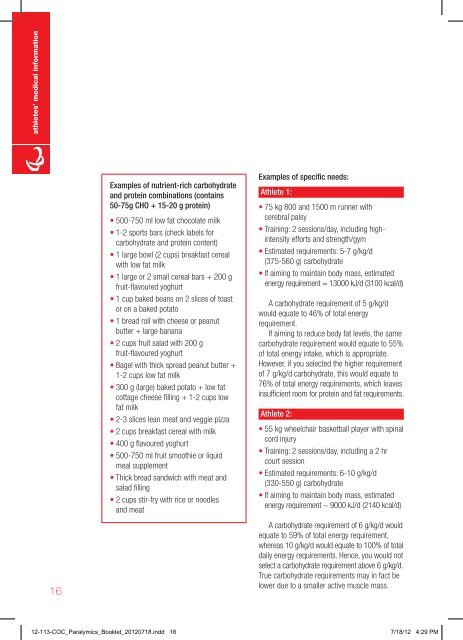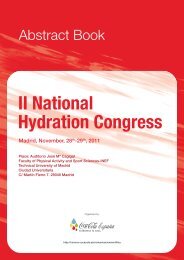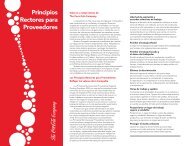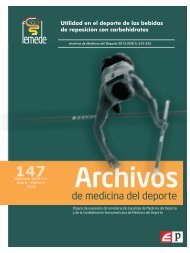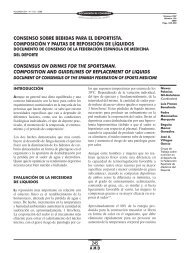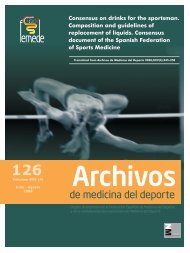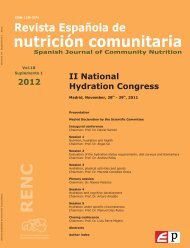athletes' medical information - Coca-Cola
athletes' medical information - Coca-Cola
athletes' medical information - Coca-Cola
You also want an ePaper? Increase the reach of your titles
YUMPU automatically turns print PDFs into web optimized ePapers that Google loves.
athletes’ <strong>medical</strong> <strong>information</strong><br />
16<br />
Examples of nutrient-rich carbohydrate<br />
and protein combinations (contains<br />
50-75g CHO + 15-20 g protein)<br />
500-750 ml low fat chocolate milk<br />
1-2 sports bars (check labels for<br />
carbohydrate and protein content)<br />
1 large bowl (2 cups) breakfast cereal<br />
with low fat milk<br />
1 large or 2 small cereal bars + 200 g<br />
fruit-flavoured yoghurt<br />
1 cup baked beans on 2 slices of toast<br />
or on a baked potato<br />
1 bread roll with cheese or peanut<br />
butter + large banana<br />
2 cups fruit salad with 200 g<br />
fruit-flavoured yoghurt<br />
Bagel with thick spread peanut butter +<br />
1-2 cups low fat milk<br />
300 g (large) baked potato + low fat<br />
cottage cheese filling + 1-2 cups low<br />
fat milk<br />
2-3 slices lean meat and veggie pizza<br />
2 cups breakfast cereal with milk<br />
400 g flavoured yoghurt<br />
500-750 ml fruit smoothie or liquid<br />
meal supplement<br />
Thick bread sandwich with meat and<br />
salad filling<br />
2 cups stir-fry with rice or noodles<br />
and meat<br />
Examples of specific needs:<br />
Athlete 1:<br />
75 kg 800 and 1500 m runner with<br />
cerebral palsy<br />
Training: 2 sessions/day, including highintensity<br />
efforts and strength/gym<br />
Estimated requirements: 5-7 g/kg/d<br />
(375-560 g) carbohydrate<br />
If aiming to maintain body mass, estimated<br />
energy requirement = 13000 kJ/d (3100 kcal/d)<br />
A carbohydrate requirement of 5 g/kg/d<br />
would equate to 46% of total energy<br />
requirement.<br />
If aiming to reduce body fat levels, the same<br />
carbohydrate requirement would equate to 55%<br />
of total energy intake, which is appropriate.<br />
However, if you selected the higher requirement<br />
of 7 g/kg/d carbohydrate, this would equate to<br />
76% of total energy requirements, which leaves<br />
insufficient room for protein and fat requirements.<br />
Athlete 2:<br />
55 kg wheelchair basketball player with spinal<br />
cord injury<br />
Training: 2 sessions/day, including a 2 hr<br />
court session<br />
Estimated requirements: 6-10 g/kg/d<br />
(330-550 g) carbohydrate<br />
If aiming to maintain body mass, estimated<br />
energy requirement ~ 9000 kJ/d (2140 kcal/d)<br />
A carbohydrate requirement of 6 g/kg/d would<br />
equate to 59% of total energy requirement,<br />
whereas 10 g/kg/d would equate to 100% of total<br />
daily energy requirements. Hence, you would not<br />
select a carbohydrate requirement above 6 g/kg/d.<br />
True carbohydrate requirements may in fact be<br />
lower due to a smaller active muscle mass.<br />
12-113-COC_Paralymics_Booklet_20120718.indd 16<br />
7/18/12 4:29 PM


